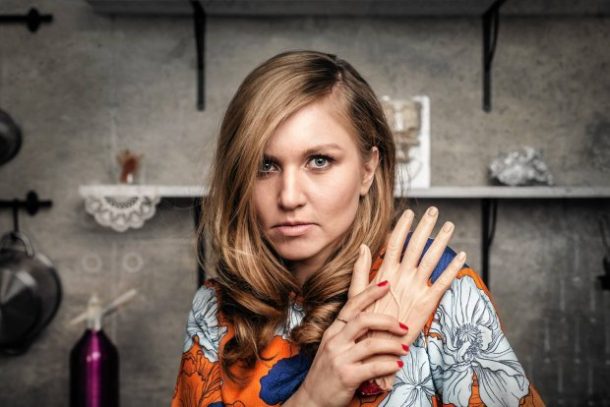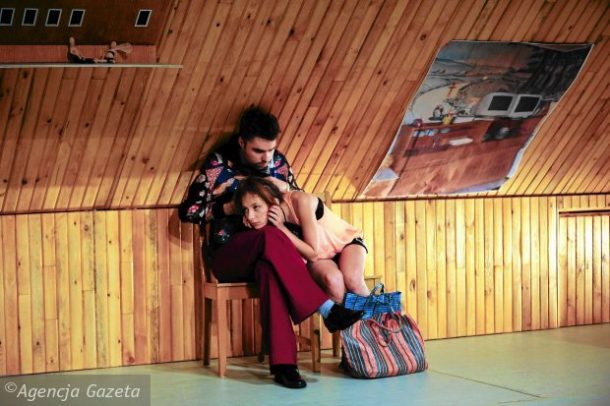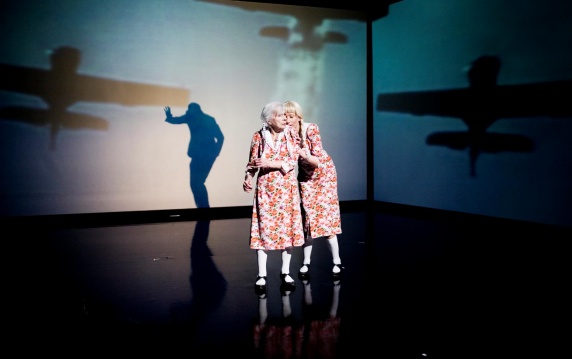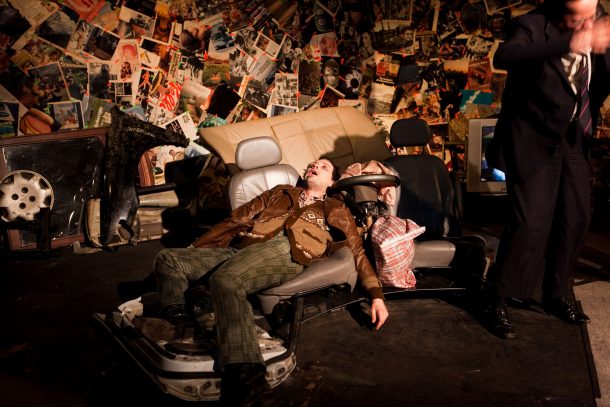Dorota Masłowska, considered by some to be already a classic, established herself as a prominent voice among the post-communist and post-dramatic playwrights in Poland through two famous theatre texts – A Couple of Poor, Polish-Speaking Romanians (2006) and No Matter How Hard We Tried, Or We Exist on the Best Terms We Can (2008). Her disjointed narrative style, twisted use of language, sensitivity to media-dominated culture, and critique of consumerism express the concerns and dilemmas of her generation.

Dorota Maslowska. Photo: Kobas Laksa.
In 2002, her first book Snow White and Russian Red (written while still a teenager) created both a rupture and a scandal mostly because of the rough, drug addict-inspired language she adopted for her prose. The title, in literal translation coming to mean “Polish-Russian War Under the White and Red Flag”, displays a baroque playfulness characterizing Masłowska’s style. This landmark text of the twenty-first century Poland was soon turned into a film.
Her other books are The Queen’s Spew (2005), Honey, I Killed Our Cats (2012) and a book ostensibly meant for children, How I Became a Witch (2014). In 2014, she crossed over from writing to performance by producing a music DVD called Mr.D: The Society is Mean where she performed her own lyrics. Like her other works, these short DVDs may shock and upset, but while triggering outbursts of laughter, they, first of all, make us take a moment to reflect and ponder on the oddities and contradictions of the trash culture that we inhabit.
Krystyna Illakowicz (KI):When I come to your performances all tickets are sold out and the average age of the audience is no more than 30. What draws these young people to the theatre, your theatre? What can theatre, Polish theatre in particular, offer to young people in this time that is so dominated by the electronic and social media?
Dorota Masłowska (DM): Theatre appeared in my biography a bit by chance. I feel more like a writer or an interdisciplinary artist than a playwright. In fact, I wrote only two plays: A Couple of Poor Polish-Speaking Romanians and No Matter How Hard We Tried, Or We Exist on the Best Terms We Can. And it was quite a while ago. The last one I wrote seven years ago. For me that was just an episode, but these texts already have been living their own lives. Somebody constantly stages them anew, updates them, and breathes new life into them. They are performed on various stages – student, mainstream, or those very serious national ones. They somehow function. Also my prose texts have had many stage adaptations. So you can see quite a lot of my stuff in Poland.

A Couple of Poor Polish-Speaking Romanians, written by Dorota Maslowska. Photo: Agencja Gazeta.
KI: The specific type of language you introduced has caught on and is now heard everywhere in the new Polish theatre. How did you do it?
DM: I don’t know. I have never had such a goal. Most probably it is a matter of the language I use. From the beginning, in my writing I developed a very specific style that was imitating everyday speech and at the same time was very highly crafted and poetic. It turned out that it works very well in the theatre. And second, these texts are written by a person who has never been interested in the theatre. I was completely uninterested in the theatre and I knew nothing about theatre conventions. Paradoxically, that proved to be my strength. My plays were simply different. I am a great fan of this kind of innocence. I think that the lack of knowledge of the rules is a great starting point when you want to create something; it gives you freedom and suppleness. Everything I did in the field of literature (and music as well) is an outcome of that kind of innocence and the lack of awareness that one is not supposed to do things this or that way. The language I use is very idiosyncratic and individualistic, and because of that it is contagious.
KI: Yes, often when I watch the work of some contemporary playwrights whose work I like and value, I still hear Masłowska’s voice (somehow, deeply and subliminally).
DM: Indeed, sometimes I hear the rhythm, whole phrases, a vocabulary that sound like my own, but I am sure that this is not a conscious plagiarism, but a sort of linguistic infection.
KI: How did your adventure with the theatre start?
DM: After the publicity storm created by my first two novels, I had a moment of hesitation when I didn’t know what to do with myself. Then Grzegorz Jarzyna, a famous director from the Rozmaitości Theatre (TR Warszawa), showed up and asked me to write a theatre text for him. It was completely beyond my interests, but I thought that just because of that I had to try. This is how A Couple of Poor Polish-Speaking Romanians came into being.
KI: You have a very specific way of speaking about culture. How do you “listen” and perceive the surrounding culture?
DM: Perhaps it is this obsession with language, listening deeply to how people speak. I am absolutely certain that the way people speak connotes sociological and cultural processes. We only need to listen.
KI: And how did you start catching this “new speech,” this something so characteristic for your theatre?
DM: I think this can be some kind of a “neurological deviation.” This is how my memory works. I remember all phrases with all details and mistakes. Recording spoken speech excited and fascinated me from childhood. I almost experienced metaphysical shivers when I heard somebody speaking in a fashion different from others, incorrectly, or in a funny way. And I think that my style is branded with that kind of perception of language.
KI: It is fascinating for me that everything you write appeals so strongly to young people. Do you feel like a “bard” for the young, post-communist generation?
DM: For them, I am already a classic. When I meet young high school or university students I feel that I am an elderly lady for them, as if Eliza Orzeszkowa (a Polish leading writer from the end of the nineteenth century) was coming to visit them, since the atmosphere of our meetings are so solemn.

No Matter How Hard We Tried, written by Dorota Maslowska. Photo: Kuba Dabrowski.
KI: But they do come to see your plays. In your theatre you create great bursts of laughter and deep, alarming silences that make the audience almost stop breathing. Such reactions (that I only remember from great Polish Romantic spectacles) I saw both at the Grzegorz Jarzyna realization and during the recent one by the theatre students from the Kraków Theatre Academy. How do you achieve such effects?
DM: I am pleased to hear that. I know that people often react deeply to these plays – they laugh and cry. I think that this is simply an outcome of a simple truth – if the text I write makes my heart beat, it will also affect the viewer. Ambitious theater in Poland often used hermetic means of representation and thus, was losing many viewers. What I write seems rather democratic because I mix high and low plots. A subjective, intuitive and a sort of naïve approach coming from the heart has always been important to me. In my writing, I have always tried to avoid market-oriented, calculated strategies and confluences. Everything I write is an outcome of my disagreement with the surrounding world, and is charged with my emotion and anger. It is difficult to explain, but somehow this anger has been constantly alive and it makes my texts live.
KI: Yes, your texts are very vital and visceral. This is not Broadway or Polonia theatre in Warsaw.
DM: In fact, I have nothing against pop and I try to situate myself in its regions. When pop is well made, it can be both entertaining and carry deep messages.
KI: You say well made, so we are dealing here with the theatre craft, the way things are done. What should the director or an actor take from your text?
DM: It is hard for me to comment on this. There must be a correlation of various elements – it is necessary to pay attention to details of that language to articulate its humor and absurdity. It also concerns a certain level of surrealism and psychedelia since these are also very important in my texts. All attempts at translating my texts into literal reality usually end in a complete fiasco. I know that often the directors are very enthusiastic in the reading phase, but when it comes to actually staging the work it becomes surprisingly difficult.
KI: Let’s return to the question of language. You speak from your gut, in a language that you pick up on the street. Could you comment on that?
DM: Working with language is an interesting process. I have a feeling that a deep analysis of that rough, clumsy, awkward, and pock-marked everyday speech allows me to catch a slice of common consciousness. When I sit at my computer I never know how to begin, what to write; I am not an intellectual type and I will rather watch sitcoms than read Susan Sontag. Only when I delve deeply into language itself and its details am I able to generate a valid reflection.
When we talk we make connections naturally and without thinking, unaware of the whole bustling process taking place behind the words. But in language, there is history, and also a power to create, and therefore, the future. What I do seems like a smear test, a sample, a linguistic biocenosis. In the artistic process I take mental pathogens and blow them up until they appear in their full glory – these are our beliefs, prejudices, and superstitions, but we would never even admit we have them. As a student I have never been thrilled by linguistics, but I am interested in language as my artistic material. This is more or less what my writing method looks like. Perhaps I should patent it? But I am not afraid that somebody will start writing the way I do.
KI: This is your voice – very strong and endowed with an artistic intuition. Witold Gombrowicz had such an intuition and he also listened to the rhythm of speech and all the nooks and crannies of language.
DM: Exactly. Delving into language, you encounter something much bigger, untrammeled and wiser than you are. You transgress yourself and your perception. This is fascinating for me. Whatever you hear and see every day is meek and trivial in comparison with what you can hear when you really “listen” to the words. In fact, I could say that writing is a form of meditation on language.
KI: Your plays were performed in the US several times – in New York, Los Angeles, Chicago in regular and university theaters. You had meetings with the American theatre community at New York University, the Segal Center, CUNY, and recently, in Chicago. What is your perception of American audiences?

New York production of A Couple of Poor Polish-Speaking Romanians, written by Dorota Maslowska. Photo: Paul Bargetto.
DM: A Couple of Poor Polish-Speaking Romanians as well as No Matter How Hard We Tried were staged many times in Europe, both Western and Eastern, and in the post-Soviet bloc countries where people have identity issues similar to our Polish ones. But the US is a difficult context for these plays, because in spite of quite a considerable Polish minority, Poland with its complicated historical traumas is unreal from an American perspective. Additionally, there is a question of language, which is the biggest attraction of these plays, but is terribly difficult to translate. Here, I would like to extend my great thanks to Benjamin Paloff and Artur Zapałowski – the translators. It is to a great extent due to their work that American directors found some universal potential in these plays. It is quite surprising to me. I am just returning from the Chicago premiere of No Matter directed by Max Truax (Trap Door Theatre, May- June 2016). Many viewers were very emotional and cried. It struck me that in that performance Poland really looked non-Polish, because it was so full of American details. It is fascinating when a play is made in a different cultural context and comes to be filled with that other culture’s content and symbols.
KI: A Couple of Poor Polish-Speaking Romanians directed by Paul Bargetto was also very well received in New York (2011). So why do these texts, on the surface so strongly situated in the Polish context, affect American audiences?
DM: Indeed, the audience reacted very strongly and people were moved by our Polish struggles with history and identity issues. But for me to see these plays staged is not so exciting any more. I am excited when I write, later I see in them the success of the director and the actors. They fill these texts with their own imagination, their bodies and voices.
KI: What can Polish theatre offer to American audiences? Is it mainly identity issues, perceptions of history, and Polish-Jewish and Polish- German themes? Not so long ago two anthologies with Polish theatre texts appeared in the US and both your plays are in them. How do you perceive yourself in that theatre?
DM: I see theatre as one of the available artistic media, one of the conventions I can use, but I am not fixated on it. I am fascinated by its power of affecting the audiences that is stronger than film because of the lack of separation by the screen. And the theatre is palpable, alive, and close; and when it’s bad, it’s so essentially bad that you want to die of shame for the actors. But when it is good it is a land of magic and metaphysics. And this is what fascinated me in the theatre – its capricious and ephemeral nature. And that it can be more intense than anything else – a concert, a book, or a film. It can be a real event in our lives. Polish theatre, of course, has its specific subversive character and traditions of engagement in political struggles. It has always been subversive because it is difficult to censor it. At this moment, it is a bit like that as well, as we constantly grind in it the most difficult of our problems. But it is difficult because Polish theatre is supported by the state and public money and that means that it has to respond to public expectations.
KI: During the 1960s-1980s, the strength of the Polish theatre was the lack of text (I’m thinking about Jerzy Grotowski, Tadeusz Kantor and Gardzienice). In the last 10-15 years I noticed many more theatre texts and what is interesting, many were written by women. As if after the entrance of Dorota Masłowska, something opened. How do you see yourself among these women writers?
DM: I never identified myself with these circles. I am from a different group. But the director in Poland is still a man – this is the conviction and tradition in Poland. And if a woman appears in that role, immediately, everybody literally and metaphorically wants to pat her butt. Women must have twice as much courage, strength, and the nerve to work in the theatre because apart from making a performance at every step they need to fight that stereotype.
KI: Do you identify with a woman’s voice?
DM: It’s a very complex question for me. I know that I have a very feminine sensibility, but it has never been an issue for me. I have always been excited when experimenting and pretending to be someone else – for instance, when I was speaking a male narrative voice. Even though everything I wrote has always been rebellious and angry, I have had a feeling that it was not a strictly feminine rage, but a generally human outcry going beyond gender. Perhaps I was too young to speak my own voice. In fact, I see that as the years go by, my texts fill with female characters. My last book Honey, I Killed Our Cats – the characters were only women. I also wrote a book for children – How I Became a Witch – this has already been turned into a musical.
KI: I have a question about the present political situation in Poland where the people are talking again about censorship. How will this situation affect the theatre?
DM: Recently the extreme right holds power in Poland and these groups implement a completely different model of culture than the more left/center-oriented previous government. It is based on the idea that culture is not an entity that should be wisely and responsibly supported by the state, but on the contrary, it can be, sort of, hand-maneuvered to promote concrete political outcomes. Horrible and irreversible things are happening. Professionals and specialists are being replaced by quite haphazard and untrained people. Certain institutions such as the Polish Cultural Institutes abroad that functioned very well have been destroyed. The idea of national culture has resurfaced and is being pushed through ideas revolving around the figures of John Paul II or Lech Kaczyński, and the so called “Baptism of Poland” from the year 966. All this is purely absurdist, but also extremely vulgar and destructive because how can real culture be created fulfilling such orders from above? I find all that outrageous, sad, demoralizing, and crazy.
KI: This is nothing new for the Poles, but today commercialism adds a new twist to that sort of manipulation. We’ll see. And now I have to add a question you do not like. What are your plans?
DM: For the past three years I was preoccupied with music. At home I produced a CD and a DVD with my songs – texts and music – Mr.D: The Society is Mean. I was looking for a niche in which I could be free as an artist, because for the last fifteen years when practicing literature and theatre I started feeling tired with my own persona as if I were branded with Gombrowicz’s “pupa” (mug). That music was just a pretext – it made me feel again that I am doing something against the public expectations and demands. Now, I am preparing to record my second album, but this is not that simple any more, since again, I sense the public expects my next spectacular success.

Dorota Maslowska. Photo: Grazyna Makara.
KI: You are very modest. I think that all the texts you wrote – literary, theatrical, and musical – contributed to freeing a very special creative energy among the young generation of Polish writers, and they changed the Polish literary and theatrical stage.
DM: I am not denying that. But I am in such a moment in my life that the theatres and the publishers want me to give them anything, even a shopping list, and its success is still guaranteed – even if only in terms of publicity. This is very frustrating and I do not want to work like that. And this is not because I am especially sincere. But it does not work. My heart is not beating, and when I really write it has to beat.
KI: I wish you a lot of inspired writing where your heart really beats. Thank you for the conversation.
Krystyna Lipińska Illakowicz teaches Polish language, theatre, and film at Yale University. She writes on Polish-American cultural exchanges, theatre, and film. She has published both in English and Polish about Witold Gombrowicz, Bruno Schulz, Tadeusz Kantor, and others. Currently, she is working on a book tentatively titled The Image of America in Poland in the 1920s and 1930s.
European Stages, vol. 8, no. 1 (Fall 2016)
Editorial Board:
Marvin Carlson, Senior Editor, Founder
Krystyna Illakowicz, Co-Editor
Dominika Laster, Co-Editor
Kalina Stefanova, Co-Editor
Editorial Staff:
Cory Tamler, Managing Editor
Mayurakshi Sen, Editorial Assistant
Advisory Board:
Joshua Abrams
Christopher Balme
Maria Delgado
Allen Kuharsky
Bryce Lease
Jennifer Parker-Starbuck
Magda Romańska
Laurence Senelick
Daniele Vianello
Phyllis Zatlin
Table of Contents:
- The 70th Avignon Festival: An Experiment In Living Together by Philippa Wehle
- The 2016 Berlin Theatertreffen: Is Half a Festival Better Than None? by Marvin Carlson
- Introduction au Kunstenfestivaldesarts de Bruxelles 2016 by Manuel García Martínez
- The Fidena Festival, 2016 by Roy Kift
- The Noorderzon Festival in Groningen by Manuel García Martínez
- Review of The Suicide by Steve Earnest
- Spain: Runaway Hits and Ephemeral Memorabilia by Maria M. Delgado
- The Seagull: An Idea for a Short Story by Emiliia Dementsova
- Billy Elliot The Musical at the Hungarian State Opera by James Wilson
- Chorus of Orphans: A Theatre Séance by Poland’s Teatr KTO, Kraków by Jacob Juntunen
- Theatre More Arresting than Ever: A Conversation with Dorota Masłowska by Krystyna Lipinska Illakowicz
Martin E. Segal Theatre Center:
Frank Hentschker, Executive Director
Marvin Carlson, Director of Publications
Rebecca Sheahan, Managing Director
©2016 by Martin E. Segal Theatre Center
The Graduate Center CUNY Graduate Center
365 Fifth Avenue
New York NY 10016



